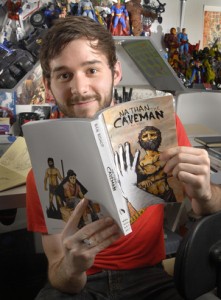
Three years ago, I met Ben Bishop at New York Comic Con; an aspiring, self-published, graphic novelist from Portland Maine. Flipping through his 300 page book, Nathan the Caveman, a graphic novel published in 2008, I was entranced with the intricate details of his art. Dark shadows and clear-cut facial features, brought the characters of his story to life. Ben Bishop, with his first graphic novel, knew how to tell a solid story from start to finish and since then, has done nothing but hone his skills and pursue his passion.
Sarah and I had the wonderful opportunity of sitting down with Ben, this year at New York Comic Con to discuss his past, present, and future endeavors.
Max Pfeffer: Alright, Ben, nice to see you again.
Ben Bishop: You as well.
MP: When did you start liking comics?
BB: As far back as I can remember. I’ve always liked comics. Someone asked me recently, like, where I used to get my comics—If I can remember my first comic—It’s really a weird, fuzzy area because I really don’t remember. I feel like I’ve always had them around—and toys; everything was very character driven; Ninja Turtles, stuff like that has made me always want to create stories—as long as I can remember.
MP: Awesome! So, when did you first realize your passion for creating comics and what was the first one that your worked on or created?
BB: Well, I’d been, like I said, drawing forever—four years was the longest back someone had told me I was drawing. But I stapled together my first comic when I was eleven years old; a Fantastic Four ripoff called Splash; it has nothing to do with the Tom Hanks movie. And then I wrote to Marvel Comics when I was eleven asking them for a job. They actually wrote back and told me to keep sharpening my skills. So, that’s what I’ve been doing since then.
MP: Wow, very cool. So, your first major self-published graphic novel is Nathan the Caveman. What inspired that graphic novel?
BB: I was in my first year, and only year, actually, at Maine College of Art in Portland, Maine. When we went downstairs, there’s the Portland Art Museum on the first day of Art History class. They’re going through slides, in a big slideshow presentation, describing everything we’re going to talk about through the year; going through all of the different areas and times of art, like Bauhaus and Renaissance. Then they got to Cave Painting and they were saying that “it was the first form of art and that we don’t know why they were in there painting on walls instead of hunting.” Then they just moved on. I thought, ‘Well that’s weird. If it’s the first, why haven’t we put more stock in to finding out why they were doing it and the purpose of it.’ And I figured it’s the same that it is today for creative people who need to write and draw—like they just have to and the reason that they have to is for a love of that or a love something, some muse. So, if it’s the same as it was then that it is now, I figured that I could do a story mirroring those two things.
MP: Could you tell us about some of the other short comics that you have done?
BB: After Nathan the Caveman,which took four years, I was like ‘I’m not going to do another big story, I’m going to do a bunch of small stuff, and different types of stories. The first one I did was called Oh My Black Eye, an eight page story. Again, it was two timelines for some reason, about this guy who’s telling a story about the first time he got a black eye when he was a little kid to impress a girl. As he is telling that story, narratively through the comic, you see him in a bar, trying to rescue a bartender who is getting hassled by these jocks. He ends up getting another black eye. The girl asks him at the end, “Did it work?” and he’s like, “Yeah, it worked.”
The other one was a collaborative comic called The Collective, where I would do the first chapter—write and illustrate it, hand it to another local comic artist/writer and they would continue it—kind of like the telephone game—just keep going at it with different artists and writers. That’s about five chapters in right now, and it’s a really long process because you’ve got to wait for the guy in front of you before you know what happens in order to finish the story.
After that I couldn’t really help it anymore. I think it was New York Comic Con, less than two years after Nathan the Caveman, I had the next idea for my next big book which is Something Like Falling—which I’ve been working on for about two and half years now, slowly; it’s only about 50 pages in. That one is about, elevator pitch—it’s about twin brothers on a road trip across America to find the father they never knew for the mother who gave up hoping he’d ever come home—and then that father’s story, taking place 30 years earlier, about why he never made it back.
Besides that, since I’ve been doing all of those things—getting them out there and getting press, I’m getting my first book that’s not self-published, which is coming out next month through Down East Magazine, in Maine. They publish 150 books a year in addition to their magazine every month. That is going to be their first graphic novel.
And I’m doing a book with Jim Krueger who did Justice and Earth-X. He’s worked for Marvel, DC, all of these other companies. We’re doing a book called The Stand-In for Atlas Comics. So, a lot going on.
MP: Can you tell us a little bit about those two books that you are doing right now?
BB: Yeah, Lost Trail is the graphic novel retelling of a famous Maine book called Lost on a Mountain in Maine. It’s the true story of this guy, Don Fendler, who, when he was twelve years old, he got separated from his family on Mount Katahdin in Maine. He was lost, on the mountain, for nine days and he survived, and made it out—it was 1939—so it was a really big deal, it was in The New York Times, The Bangor Daily News. So that book came out immediately following that, and he didn’t get a single royalty from that book. His entire life he’s been going to schools and selling that book—he’s sold thousands and thousands of copies—and so he’s like, ‘I need something for my family; something to leave behind’ because he’s 88 years old now.
So, he got together with Down Eat Magazine and they opted to do this book for him for a whole new audience. There are new details in it about the hunt for him. So, it comes out next month, we’ll see how the actual “getting published” business works. So far it is a little different, for better or worse. The other book with Jm Krueger is something I had to put on hold to get Lost Trail done. The worst part of for better or worse, was that on Lost Trail, the publishers didn’t really put the time line together very well and I was only given two months to do the whole book. I did 67 pages in two months. I usually do one page a day which is pretty average—that’s what Jack Kirby said they do—I was doing three, sometimes three and half a day. It was wild. Sadly, it’s not my best work but it is a testament to speed, I guess. Now it is out there and published, so hopefully it opens some doors.
But the Jim Krueger book, The Stand-In, is about this failure of an actor in New York City—his theatre is closing down—he’s just not very good. But what he is good at is dressing up like a famous New York senator. He can get into this certain restaurant to get free meals with his friends and he gets busted. They’re like, “Wow, it’s really uncanny how much you look like this senator.” So they ask him to stand in for the senator at stupid things like kissing babies, and signing things while the senator is off doing important stuff. It just so happens that this is the role of his lifetime.
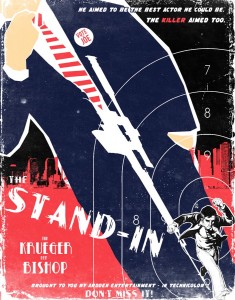 People will not believe that he is not the senator when there is a hit out on him. So he’s on the run the entire book because of a lot of political stuff that is happening in the book. There’s a certain bill that people don’t want to get passed so they’re trying to kill the senator. And he pretty much can’t convince anyone that he is not the senator.
People will not believe that he is not the senator when there is a hit out on him. So he’s on the run the entire book because of a lot of political stuff that is happening in the book. There’s a certain bill that people don’t want to get passed so they’re trying to kill the senator. And he pretty much can’t convince anyone that he is not the senator.
MP: Wow, sounds like some great books. So, I know that you are currently trying to get your work out to Marvel, especially, and trying to make something work with them. If you were to be working with Marvel, what kind of books would you like to do?
BB: Pretty much, for Marvel, I would do anything they told me to. If they were like, “We need you to be the guy who staples the comics together” I would do it. But, I really like Avengers. I think out of most of the samples that I did for them, I did three different scripts—I did Astonishing X-Men, Avengers, and X-Force—I think I like the Avengers characters and what’s been happening in those stories for the past ten years, the most. Plus, you know, Wolverine pops in and out of The Avengers; Spiderman pops in and out of The Avengers; so, it’s a good opportunity to draw everyone. Yeah, anything I could do, really.
MP: So, will you be checking out The Avengers panel today?
BB: Yeah, it’s on my list. I missed a couple of panels just waiting outside of the portfolio review for Marvel. But I just had the review—it went well. Hopefully I don’t miss The Avengers panel.
MP: One final question: You’ve come this far, and your art from what I’ve noticed is really distinct and I really enjoy everything you’ve done so far. So, what writers and artists have inspired you?
BB: I’ll start with who inspired me to make graphic novels in the first place and that was Craig Thompson, of Blankets—600 page, no superheroes; he said he wanted to make a 600 page book about nothing. So, he started writing a book about the first time he shared a bed with this girl, Raina, his first love. Then he thought ‘This isn’t the first time I shared a bed with someone. I used to sleep in my brother’s bed. So he wrote 600 pages about that—about blankets, and first loves, and first things. Anyway, that told me that I could make giant books about anything. So, I started doing giant books about cavemen, love, and art history.
As far as art styles, because obviously, I’m not really drawing like Craig Thompson draws—just making books like he makes. Olivier Coipel, who does Thor for Marvel. He’s on Mighty Thor right now. He’s my number one favorite artist; Becky Cloonan is amazing. She does books with Brian Wood; Lionel Francis Yu is at Marvel. A lot of the people I like artistically wise are more mainstream comics and a lot of the books I like are more Indy comics. So, it’s pretty strange. I’m somewhere in the middle of that and I think that’s what I’m dealing with with Marvel. He’s like “You need to choose. Are you somewhat cartoony and expressive? Or, are you drawing hot girls and really solid action scenes?” Drawing the marvel way, pretty much.
MP: Well, I guess that’s it for our interview. I really appreciate you taking the time out to do this for us.
BB: Thank you.
Well, there you have it. Ben is hard at work on quite a few projects. I would encourage you all to check out more of Ben Bishop’s work at http://bishart.net !
Stay tuned for more from NYCC!

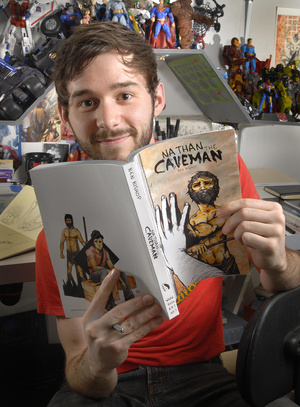
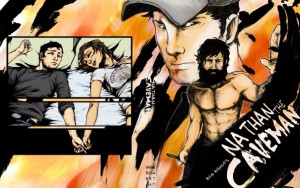
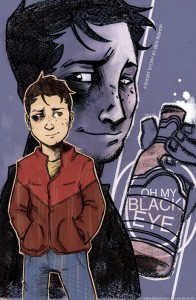
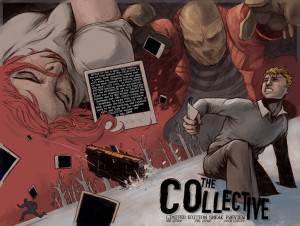
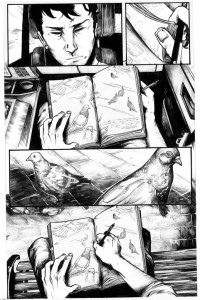
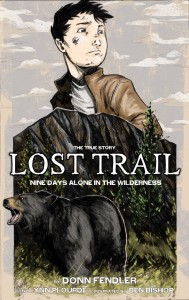
Great interview, Ben! I especially like his conclusion that books, even “giant ones,” can come from anything – that’s good to remember on those days when writers’ block is rearing its head. Thanks for sharing your conversation with him!
great interview. I like his art, very clean and polished. the stories sound really interesting as well. Best of luck Ben Bishop.